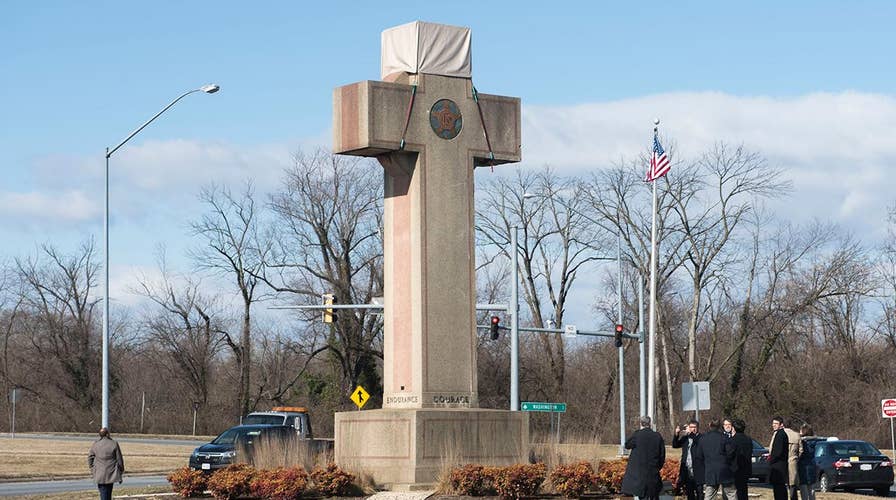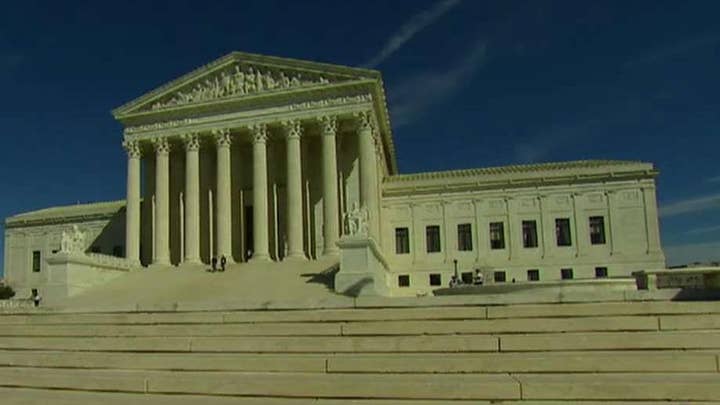A majority of Supreme Court justices offered tepid support Wednesday for letting a Maryland war memorial in the shape of Christian cross remain on government land, in a landmark First Amendment case with implications for religious symbols on public property across the country.
In a spirited 70 minutes of oral arguments, most justices appeared to accept the narrow, limited view that the monument was historically significant and its Latin cross design reflected the nationwide trend at the time it was erected to honor war dead with community memorials.
'PEACE CROSS' MEMORIAL AT CENTER OF LANDMARK SUPREME COURT FIGHT OVER RELIGIOUS DISPLAYS
"What message does that send when people see that on TV, they see crosses all over the country being knocked down?" Justice Samuel Alito asked.
The justices seemed to default to their previous approach of resolving such Establishment Clause appeals on a case-by-case basis, signaling they may avoid a broad ruling that would provide clear markers for similar legal disputes in the future.
The case is one of the most closely watched this term. Newest Justice Brett Kavanaugh asked tough questions of both sides, but gave no indication of how he would vote.
The Bladensburg Peace Cross, as it is known, sits in a traffic circle in the Washington suburbs, where it has stood for nearly a century to honor 49 local World War I soldiers who died in battle overseas.
Its supporters, including the Trump administration, say the 40-foot monument was created solely to honor those heroes and is secular in nature. Opponents call it an impermissible overlap of church and state, since it is controlled and cared for by a Maryland parks commission.
SUPREME COURT SAYS VOTE OF DEAD ‘PROGRESSIVE ICON’ JUDGE DOES NOT COUNT
"For members of other faiths, that [cross] symbol is not a way to memorialize the dead and does not have that meaning," said Justice Elena Kagan. "For many people, this is a very natural way to do exactly what they want to do. For others, not."
Fundraising for the Peace Cross began soon after the "war to end all wars" concluded. Spearheaded by Gold Star mothers of Prince George's County, Md., who lost their sons to battle, it honors 49 men, including four African-American soldiers and a Medal of Honor recipient. It was completed in 1925, built by members of local American Legion posts, with private donations. It was later rededicated as a memorial to honor all American veterans.
Inscribed at the base of the monument are four words: Valor, Endurance, Courage, and Devotion. There are no written references to God, Christianity, or religion.
A Maryland parks commission in 1961 gained custody of the cross and land around the busy intersection. The government now pays for maintenance and upkeep, though veterans groups regularly hold memorial services there. The structure includes the embedded symbol of the American Legion.
Similar cross displays on federal land to honor war dead are at nearby Arlington National Cemetery.
In Bladensburg, three area residents and the American Humanist Association filed suit in 2014, saying in court papers the memorial sends a "callous message to non-Christians."
A federal appeals court agreed and ordered the memorial be torn down, moved or modified.
The Constitution says, "Congress shall make no law respecting an establishment of religion or prohibiting the free exercise thereof."
The Supreme Court has a mixed record on disputes concerning religious freedom and the separation of church and state, with the justices often using a case-by-case determination.
In arguments, a majority of justices wondered Wednesday whether new war memorials with religious imagery would be permissible, given the diversity of faiths, and the views of atheists or agnostics.
"Look at the historical context here. History counts," Justice Stephen Breyer said. "But no more. We are a different country now, and there are 50 more different religions."
Justice Ruth Bader Ginsburg rejected suggestions such memorials can have multiple purposes.
"Does the cross really have a dual meaning?" she asked. "It is the preeminent symbol of Christianity. People wear crosses to show their devotion to the Christian faith."
"It's sectarian," Justice Sonia Sotomayor said of the Peace Cross, and also questioned whether its long history is enough to allow it to remain.
"What is the tradition?" she asked. "Is the that, in World War I, a cross was, or is the tradition that the government can put up sectarian symbols like crosses or a picture of Jesus Christ in honor of anyone because that's within the nation's tradition?"
On the other side, Justice Neil Gorsuch pushed back at suggestions the memorial's large size itself was a problem, or "too loud."
"Is it too loud? Is the Star of David too loud? Is it too offensive?" he said. "We accept that people have to sometimes live in a world in which other people's speech offends them. We have to tolerate one another. This is the only area I can think of like that where we allow people to sue over an offense because, for them, it is too loud. And we get into, as a result, having to dictate taste with respect to displays."
"I think the Constitution tilts toward liberty in its structure," added Kavanaugh, suggesting this particular cross memorial should stay.
The justices have a great deal of discretion to issue a sweeping ruling, but that appears unlikely.
Chief Justice John Roberts in part blamed the lawyers appearing before him for not offering a workable standard to guide the lower courts.
"I once was a lower court judge and if I get that type of [case-by-case analysis], I'm just going to throw my hands up," he said at one point to a lawyer. "Do you have something more concise about the test you would apply beyond looking at all the contextual factors and history and all that?"
CLICK HERE TO GET THE FOX NEWS APP
The high court in 1971 established its three-prong "Lemon" test, named for one of the parties in the case. That embedded legal standards in the relationship between church and state. But Gorsuch said that precedent has not been applied in recent years by the justices.
"It has resulted in a welter of confusion, I think, by anyone's admission," said Gorsuch. "Is it time for this court to thank ‘Lemon’ for its services and send it on its way?"
A ruling is expected by late June.























